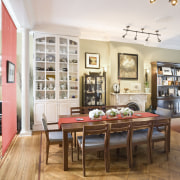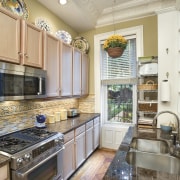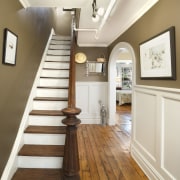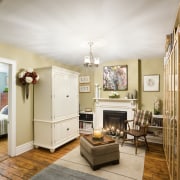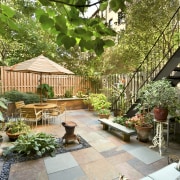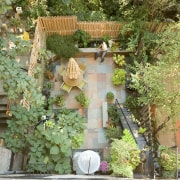Empire builders
A love of historic homes determined the purchase of this Second Empire-era house; a desire to live comfortably filled it with an eclectic mix of furniture
There is always a certain expectation when remodeling a period home that the original charm of a bygone era will be maintained. However, common sense and a modern lifestyle must be taken into consideration.
For the owners of the featured property, Gerard Orozco and Andrea Dibner, principals of Tobin + Parnes Design, there were even greater expectations that the Second Empire (1865-1880) home would maintain its original grandeur.
"The renovation and restoration of historic projects is something we do on a day-to-day basis at Tobin + Parnes. As such, we both have a passion for, and are sensitive to, historic homes," says Dibner.
The pair say they were lucky when they purchased the home after an exhaustive search as the previous owner had carried out a number of renovations to the property.
"Structurally, the house was in good condition," says Orozco. "Aside from some structural repairs to the basement, the majority of the work we've had to do has centered around repairing and re-establishing period details."

Finishing touches such as restoring plasterwork, additional millwork, interior decoration, lighting and a complete upgrade to the outdoor areas have all been carried out by the owners.
"Color is especially important as it activates the space," says Dibner. "The salmon shade was present when we bought the house so we thought it appropriate to retain it. The tannish-green shade Dunmore Cream that we carried throughout the first floor provides a warm, neutral backdrop for the art and furniture pieces to be shown at their best.
"We then emulated the Victorian penchant for decorating each room in a different color in the remaining rooms in the house."
Period architectural details have either been restored or expanded upon. The built-in cabinet in the dining area was formerly an open-shelf unit designed to hide plumbing work. The owners mimicked the original arched parlor entry doors and designed the new unit with an arched millwork and recessed panel door detail. When it came to furnishing the home, the couple was more relaxed about the period aesthetic.
"As designers, we're attracted to timeless pieces," says Dibner. "Like the Noguchi coffee table, all of the pieces are classics in their own way. They relate together on a common level."

"The architecture is the architecture it speaks its own language; whereas the furniture, through its simplicity, complements rather than competes with the architecture," says Orozco.
For the outdoor area, the plan was for something with a contemporary, open-space feel.
"The space is too small for fussy pieces, although we have included some period touches like the wrought iron plant stands and the small stove," says Dibner. "The idea was for the area to be an extension of the interior living space, to attain a certain level of comfort. It's a home after all, not a museum."
Credit list
Kitchen designer
Lighting
Furniture
Drapes
Kitchen cabinetry
Backsplash
Faucets
Microwave
Dishwasher
Paving
Kitchen manufacturer
Heating
Blinds
Other
Countertop
Kitchen sink
Oven
Refrigeration
Outdoor furniture
Planter box
Story by: Justin Foote
Home kitchen bathroom commercial design
Dovetailing with the desert
A feast for the senses
Industrial clean




